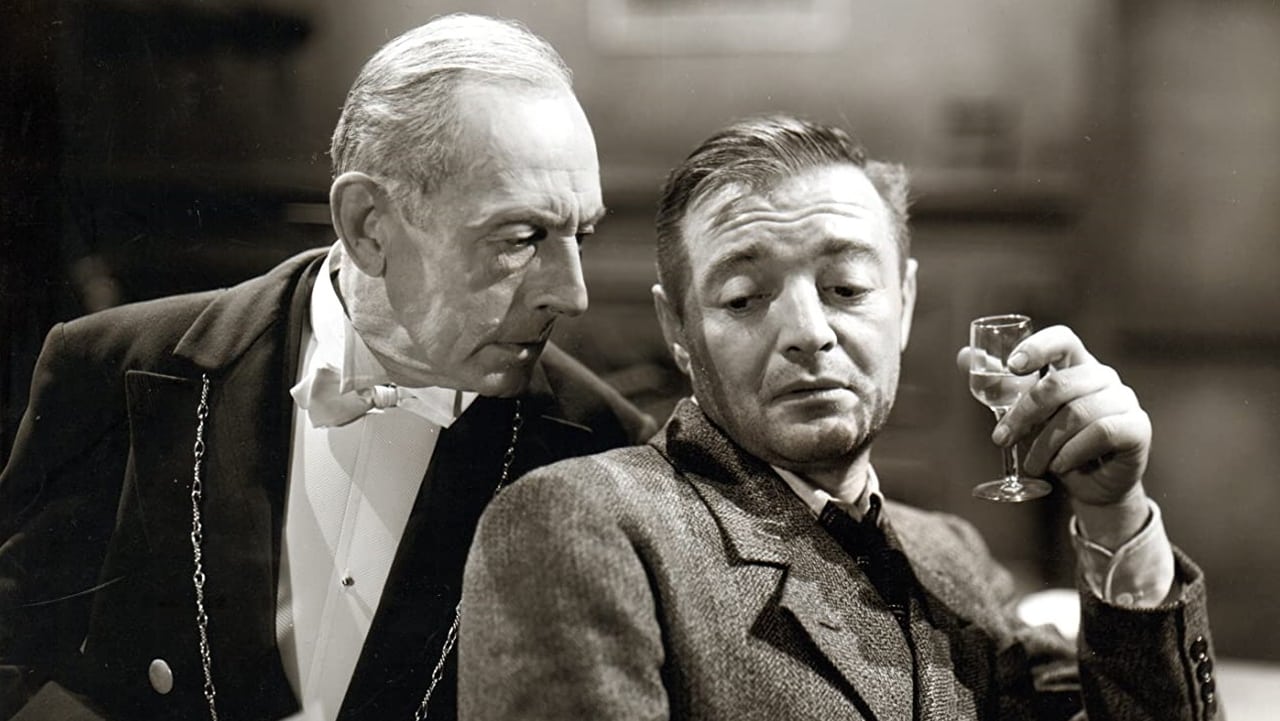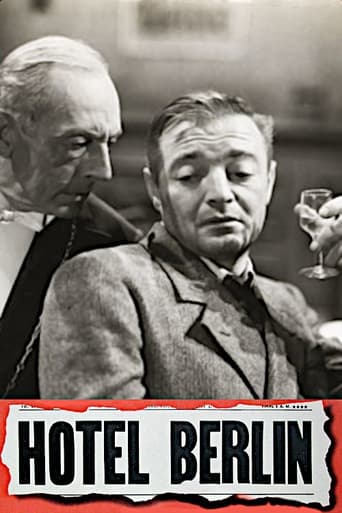

the leading man is my tpye
... View Moredisgusting, overrated, pointless
... View MoreThe performances transcend the film's tropes, grounding it in characters that feel more complete than this subgenre often produces.
... View MoreThis movie tries so hard to be funny, yet it falls flat every time. Just another example of recycled ideas repackaged with women in an attempt to appeal to a certain audience.
... View MoreCopyright 14 March 1945 by Warner Bros. Pictures, Inc. A Warner Bros.-First National picture. New York opening at the Strand: 2 March 1945. U.S. release: 17 March 1945. U.K. release: 7 May 1945. Australian release: 28 June 1945. Copyright running time: 98 minutes. Australian length: 9,007 feet. 100 minutes.SYNOPSIS: Resistance leader, cornered in a Berlin Hotel, enlists the aid of an actress to help him escape.NOTES: Vicki Baum's Grand Hold (1930) was such a runaway bestseller, she spent the rest of her life (she died in 1960) trying to recapture the extent of that achievement. "You can live down any number of flops," she once admitted, "but you can't live down a success." Early in 1942 she saw Billy Wilder's film Five Graves To Cairo from which she conceived the idea of disguising a spy as a hotel waiter. This then is a Grand Hotel in a last-days-of-Berlin setting. Originally titled "Hotel Berlin '43", it was serialized in Collier's Magazine in late 1943 and published in book form the following year. Alternative film title: BERLIN HOTEL.COMMENT: Concocted by Vicki Baum of Grand Hotel, this is a delightfully flamboyant melodrama, engrossingly acted by a second-string but first-rate cast, stylishly directed by Peter Godfrey who makes the most of Carl Guthrie's fluidly fascinating camerawork and John Hughes' broodingly magnificent sets. Peopled with a nervous array of suspensefully interlocking characters who are at the mercy of times and tides - and air raids - it's impossible to take your attention off the film for a second. I'd hate to miss just one nuance of Henry Daniell's diplomatic double-dealing (one of his largest and most memorable roles), or a single twitch of George Coulouris' cat-and-mousing, or the tiniest spasm of Peter Lorre's despairing eye-rolling ("One good German? Perhaps we'll find him in the closet!"). Every role is perfectly cast - from the major leads (Dantine as the fugitive, Andrea King as the actress sympathizer, Raymond Massey as the general-in-a-trap, Faye Emerson as the hotel "hostess") to the minor supports (Alan Hale as a vengeful Nazi, Dickie Tyler as a harried bellboy), with splendid back-up from deft players like Steve Geray and Frank Reicher.Godfrey keeps the various story strands cracking along at a merry pace. Although conceived in melodramatic terms, the story ideas show a realistic lack of compromise - there is no cop-out conclusion - which makes them far less dated and acceptable to a more cynical modern audience than most other examples of Hollywood's wartime propaganda.
... View MoreInteresting movie about the goings-on of various characters at the Hotel Berlin near the end of WWII. Specifically the search for a member of the German underground who has escaped from a concentration camp. Not surprisingly, this is from the author of Grand Hotel. Unlike the film adaptation of Grand Hotel, this one doesn't have an all-star cast but it does have a cast of solid character actors. Raymond Massey and Faye Emerson are standouts but really the whole cast is good. Peter Lorre steals the few scenes he's in. It's a pretty good though not great WWII movie with a unique setting and some frank (for the time) talk about concentration camps and the Holocaust. Also, if you ever wanted to see Alan Hale as a Nazi, here's your chance.
... View MoreMost cineastes have seen 'Grand Hotel' (1932) at least once, if only because of Greta Garbo. It was based on the play and novel 'Menschen im Hotel' by Vicki Baum, whose novels were the basis for numerous Hollywood movies, and who was a best-selling novelist in several languages. Here we see a highly complex ensemble drama set in a hotel again, but this time the action takes place in Berlin just as the Second World War is ending and the Nazi regime is falling apart. The film is well directed by Peter Godfrey, and contains some wonderful performances, one of the best being by Raymond Massey as a German general of the old school, who had been involved in one of the plots to kill Hitler which failed. He sports a monocle with applomb but never over-plays, and portrays the man with distinction and impeccable judgement. Henry Daniell as a keen Gestapo officer also does not over-play, and the restraint he shows is admirable, as Gestapo officers are such obvious targets for over-acting. The numerous dramas and sub-plots in this highly complex film are all satisfactory and convincing. The film has a tremendous dynamism as a multiple-drama, we are swept away by the dilemmas of all the characters, both noble and ignoble, and it all works. This must rank as one of the most successful wartime film dramas, and it is all about people, real people this time rather than cardboard cutouts. This film should be more widely known.
... View MoreUnusual World War II-era drama set in a Berlin hotel during the closing moments of the war. Unusual because this film presents some Germans as good and tries to separate the Nazi regime from the ordinary population who just tried to survive the madness. Very reminiscent of "Grand Hotel" -- not surprising since the author of the novel upon which the screenplay is based is the same Vicki Baum who wrote "Grand Hotel" and "Weekend at the Waldorf." Characters and sub-plots come and go with a central theme of the search for an escaping prisoner and the moral and physical decay of the Nazi regime. Raymond Massey is quite good as General Arnim von Dahnwitz, an old-school officer who participated in the plot against the Corporal and is offered the honorable way out. Peter Lorre has a brief role but why he was released from prison and other transformations must have been left on the cutting room floor. Made during the war and released after its conclusion, this is an excellent example of propaganda. Viewers are conditioned to the punishment (not justice) of the enemy, fifth columns that would have left the dying Germany to carry on the war from within North America, and the need to build a new Germany when all of the chaos ends. Not a light movie, but one that would serve well in a Film and Political Science course. Recommended.
... View More